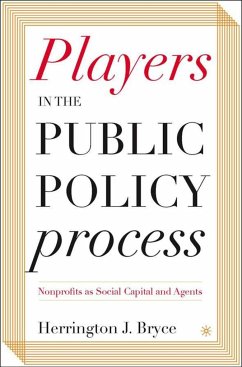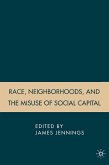This book carefully develops the perspective of nonprofit organizations as social capital assets and agents of public policy within a principal-agent framework. It shows the practical as well as managerial and marketing advantages of such an approach, one that can lead to serious questions about many of the existing views that all nonprofits result from market or government failure. Bryce provides a more positive, cross-national and inclusive perspective on these organizations that applies across all of their disciplines and in developed or developing countries alike.
'Bryce offers a compelling . . .framework for explaining the existence of a robust nonprofit sector.' - Voluntas, International Journal of Voluntary and Nonprofit Organizations
'With this ambitious undertaking, Bryce (business administration, College of William and Mary) examines nonprofit organizations as social capital assets and agents of public policy. By placing nonprofits in a principal-agent framework, he offers a welcome updated analysis of an important public policy topic. The book is exhaustively researched as evidenced in the bibliographic endnotes, and Bryce is convincing as a leading authority in the field...A useful read for scholars and graduate students interested in the topic, but not likely to be of interest to the typical undergraduate public policy student.' - Choice
'Players in the Public Policy Process raises all the important questions that the appraisal of non-profits' role in governance should. Serious students of public policy ought not to ignore this theoretically sophisticated and empirically informed work.' - Theodore R. Marmor, Professor of Public Management and Political Science, Yale University, USA
'Insightful, innovative, and well-grounded; strongly recommended.' - Julian Wolpert, Henry G. Bryant Professor of Geography, Public Affairs, and Urban Planning; Chair, Program in Urban and Regional Planning, Woodrow Wilson School, Princeton University, USA
'The increasing role of nonprofits as agents of public purpose creates both opportunities and risks. This book helps us better to understand both the sources of the opportunities and the nature of the risks.' - Steven Kelman, Weatherhead Professor of Public Management, John F. Kennedy School of Government, Harvard University, USA
'Timely, fresh, and innately significant.' - Clarence Stone, Author of Regime Politics, winner of the 2005 Charles Levine Prize for the Best Book in Comparative Policy and Administration
'An informative and useful reader for scholars and graduate students interested in nonprofits. The extensive updated analyses are grounded in exhaustive library work including detailed bibliographic endnotes, author index, and subject index. Bryce... is persuasive and knowledgeable in discussing the increasing role of nonprofits and NGOs in governance. His book provides a significant contribution to this growing field.' - Efraim Ben-Zadok, Public Organization Review
'[This] book is systematic in its exposition of arguments, clear about its assumptions, thoughtful in its use of examples, and provocative in its development of the idea of cognitive social capital as a special asset of nonprofit and nongovernmental organizations.' - Public Administration Review
'Scholars will find in this book a clear theoretical roadmap, ranging from basic legal contract theory to the principal-agent paradigm, which describes the public agent role of nonprofits.' - Journal of Policy Analysis and Management
'This book is a must-read for nonprofit and public policy scholars interested in nonprofits as an organizational form and as a shaper and instrument of public policy...this book probably should be on every nonprofit scholars' shelf.' - Organization Studies
'The author's position challenges directly the prevailing view that nonprofit organizations emerge largely as a consequence of market or governmental failure.' - Voluntas
'With this ambitious undertaking, Bryce (business administration, College of William and Mary) examines nonprofit organizations as social capital assets and agents of public policy. By placing nonprofits in a principal-agent framework, he offers a welcome updated analysis of an important public policy topic. The book is exhaustively researched as evidenced in the bibliographic endnotes, and Bryce is convincing as a leading authority in the field...A useful read for scholars and graduate students interested in the topic, but not likely to be of interest to the typical undergraduate public policy student.' - Choice
'Players in the Public Policy Process raises all the important questions that the appraisal of non-profits' role in governance should. Serious students of public policy ought not to ignore this theoretically sophisticated and empirically informed work.' - Theodore R. Marmor, Professor of Public Management and Political Science, Yale University, USA
'Insightful, innovative, and well-grounded; strongly recommended.' - Julian Wolpert, Henry G. Bryant Professor of Geography, Public Affairs, and Urban Planning; Chair, Program in Urban and Regional Planning, Woodrow Wilson School, Princeton University, USA
'The increasing role of nonprofits as agents of public purpose creates both opportunities and risks. This book helps us better to understand both the sources of the opportunities and the nature of the risks.' - Steven Kelman, Weatherhead Professor of Public Management, John F. Kennedy School of Government, Harvard University, USA
'Timely, fresh, and innately significant.' - Clarence Stone, Author of Regime Politics, winner of the 2005 Charles Levine Prize for the Best Book in Comparative Policy and Administration
'An informative and useful reader for scholars and graduate students interested in nonprofits. The extensive updated analyses are grounded in exhaustive library work including detailed bibliographic endnotes, author index, and subject index. Bryce... is persuasive and knowledgeable in discussing the increasing role of nonprofits and NGOs in governance. His book provides a significant contribution to this growing field.' - Efraim Ben-Zadok, Public Organization Review
'[This] book is systematic in its exposition of arguments, clear about its assumptions, thoughtful in its use of examples, and provocative in its development of the idea of cognitive social capital as a special asset of nonprofit and nongovernmental organizations.' - Public Administration Review
'Scholars will find in this book a clear theoretical roadmap, ranging from basic legal contract theory to the principal-agent paradigm, which describes the public agent role of nonprofits.' - Journal of Policy Analysis and Management
'This book is a must-read for nonprofit and public policy scholars interested in nonprofits as an organizational form and as a shaper and instrument of public policy...this book probably should be on every nonprofit scholars' shelf.' - Organization Studies
'The author's position challenges directly the prevailing view that nonprofit organizations emerge largely as a consequence of market or governmental failure.' - Voluntas








